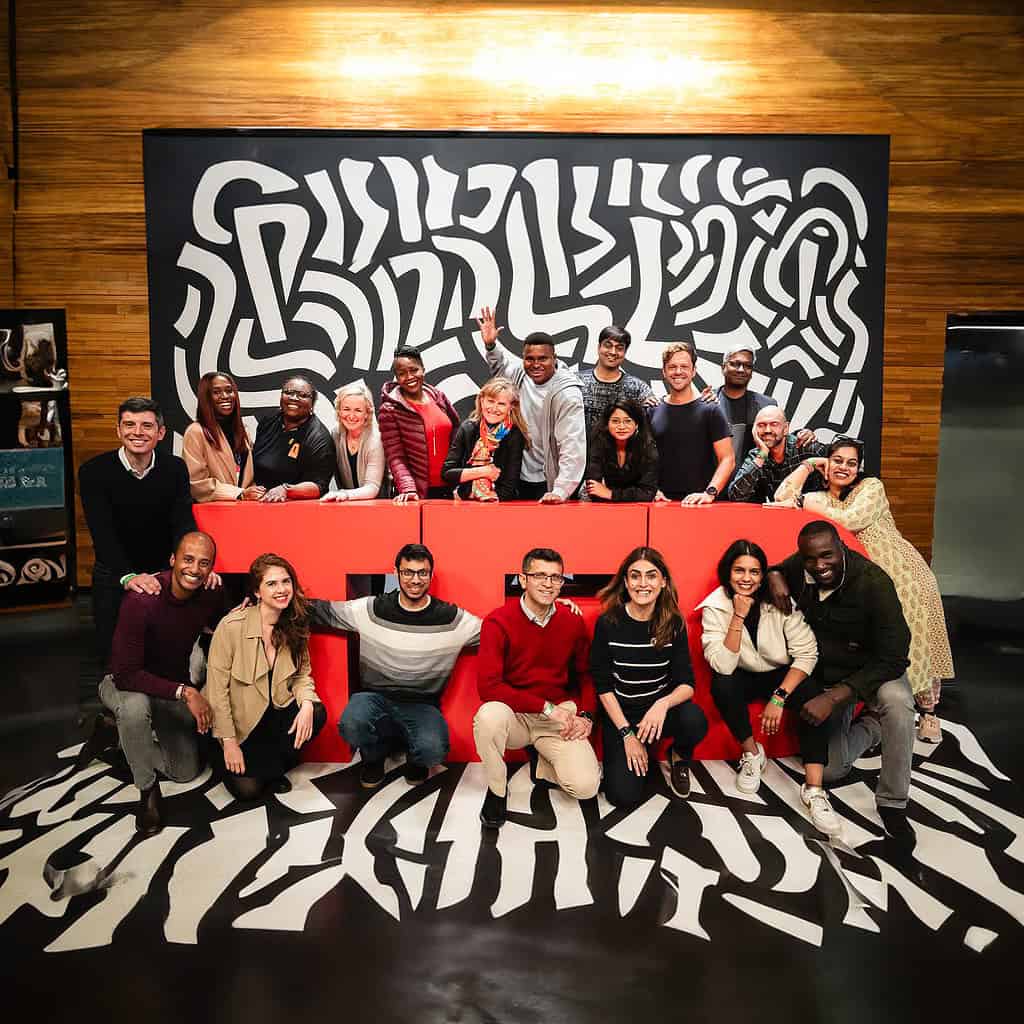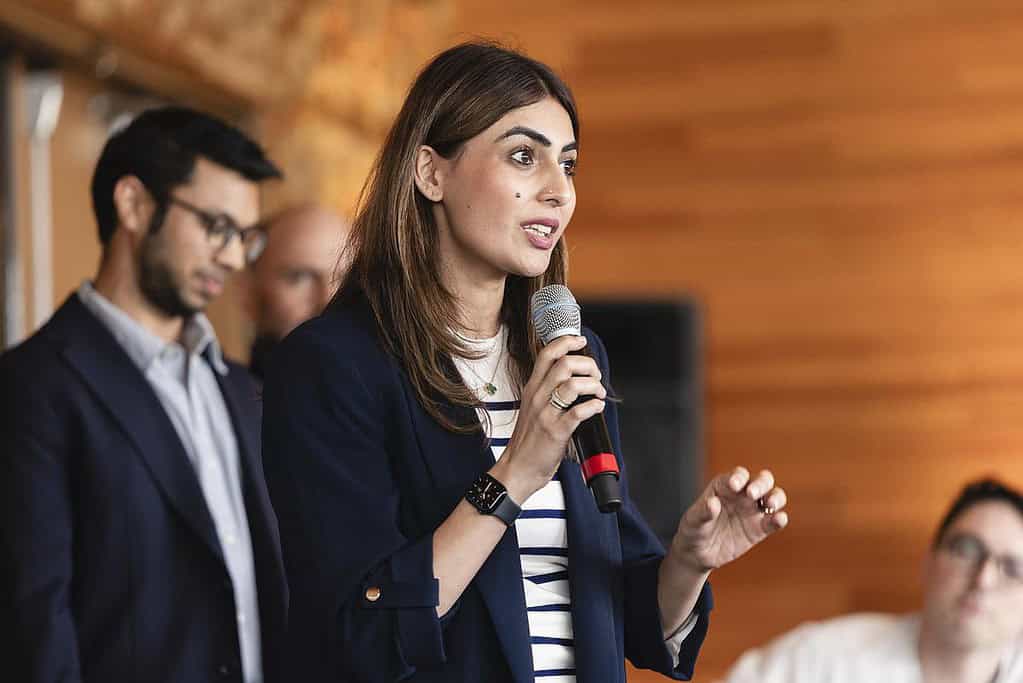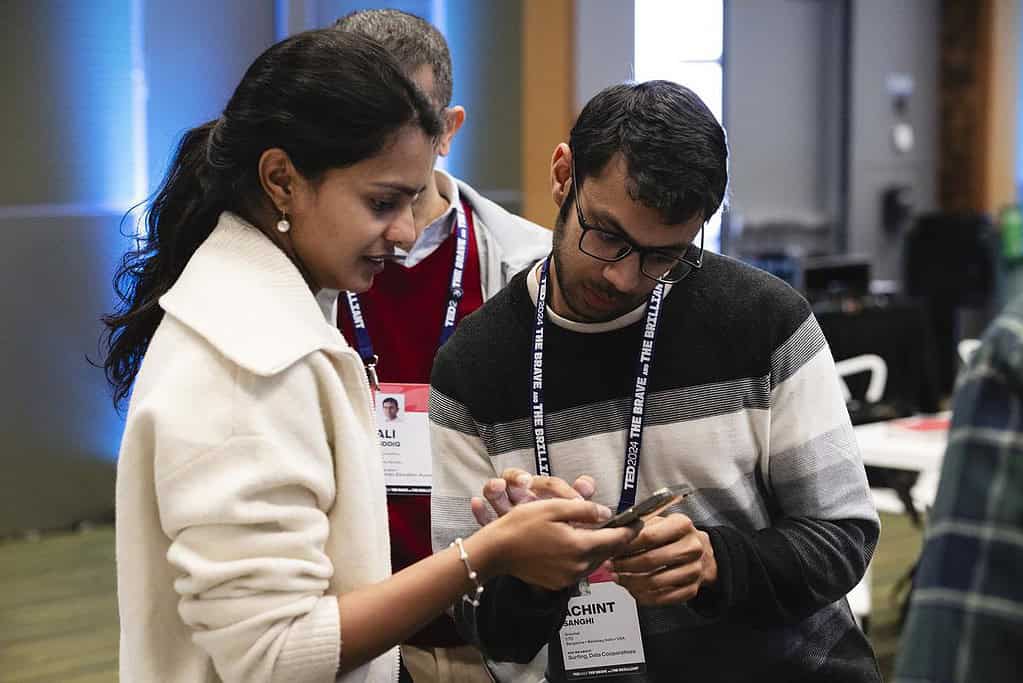TED Q&A with Haya Zahid and Soumya Dabriwal
The Brave and the Brilliant was the theme this year at TED 2024, which is also how we would describe the 16 Acumen Fellows who traveled to Vancouver to take part. We interviewed two of them about their experience.
- Blog
- All impact sectors
- All Regions

16 Fellows had their first TED experience in Vancouver last month, we caught up with Haya Zahid co-founder of Legal Aid Society in Pakistan and Soumya Dabriwal co-founder of Project Baala to hear about their experience.
What were your expectations going into TED and how did they compare to your actual experience?
Haya: Going in, I anticipated a great experience, being in close proximity to thought leaders and intellectuals. I expected diversity of ideas, depth in discussions, and walking away with cutting-edge insights. However, I didn’t anticipate the palpable energy, the infectious generosity of thought, idea-sharing, and action that envelops you as you walk into the convention center. It’s an indescribable vibe that deeply engages you on a soul level. The experience was not just intellectually stimulating but also emotionally transformative, making me feel like I belonged to this vibrant, diverse community.
Soumya: I initially expected to feel very intimidated by the conference, the speakers, and the attendees. However, my actual experience was the opposite. From day one, I found the attendees to be some of the most approachable and friendly people I’ve ever met. Conversations with influential figures, such as the founder of Netflix, felt as accessible as discussions within my Acumen community.
Which talks or sessions stood out to you the most, and why?
Haya: There were many talks that offered profound insights and actionable ideas relevant to my work in justice and development. Mustafa Suleiman and Demis Hassabis’ talk on AI, for example, was enlightening for a non-technologist like me, exploring AI’s basics and its potential to unlock scientific breakthroughs. Vinod Khosla’s points on future world developments were also beautifully framed, providing a comprehensive perspective on various life sectors. Rory Stewart’s insights on international development and justice were particularly impactful. His suggestion to empower people with unconditional cash inspired us to consider piloting this approach in one of our districts.
Soumya: Several talks resonated with me deeply. Kris Tompkins, the ex-CEO of Patagonia and now a conservationist, emphasized the importance of action with her statement, “sentiment without action is the ruin of the soul.” I continue to be impressed by her and her husband’s initiative to rewild 2 million acres in South America and convert them into national parks. Hiroki Koga, founder of Oishii, a vertical farming company, was also a fantastic storyteller who expertly and generously shared his entrepreneurial journey and vision.
What was a memorable moment, connection, or insight that felt most impactful to your work in bridging the justice gap?
Haya: While many impactful moments weren’t directly from the TED talks themselves, my conversation with the folks at Proximity for Justice stood out. They run TEDx events inside prisons, featuring prisoners, victims, prison officials, and community members as speakers. Having spent years on prison reform, I found their approach of giving a voice to those inside prisons incredibly innovative. It raises empathy and sheds light on crucial issues, offering a new perspective on justice reform and rehabilitation. This interaction provided me with valuable insights into how we can enhance visibility and communication around our work.
Soumya: Meeting Daniel Lubetzky, founder of Kind, at an Acumen lunch was a standout moment. He expressed interest in my work and connected me with his foundation, leading to ongoing conversations. Another memorable encounter was at a celebration event, where discussions with three German entrepreneurs about long-term value creation in business provided valuable insights. I also met Martin Fisher, who distributes health products across Africa. Our conversations opened up new learning opportunities for my organization’s own distribution channels in India.

What message did you personally want to bring to TED, and what do you hope the people you met remembered about you and your work?
Haya: I hope those I had deep conversations with remember me as someone earnest and deeply committed to learning and change. I often found myself in meaningful discussions with people from diverse backgrounds, from Silicon Valley millionaires to fellow change-makers. Despite the differences in our fields, the connections were profound and human. When discussing my work and dreams, I hope they saw me as committed to bridging the justice gap and bringing about progress and prosperity in Pakistan. I wanted to be seen as someone dedicated to finding solutions and making a tangible impact.
Soumya: I aimed to highlight the voices and stories of the women in our communities, especially those from marginalized backgrounds. I wanted to demonstrate the significant impact we’ve achieved with limited resources. I hope people remember me for my authenticity and the genuine representation of my work. The scale of our impact—reaching 800,000 women in five years—often surprises people and serves as a testament to the power of dedication and support.
Was there anything that made you re-evaluate your perspective or shift your perception?
Haya: I initially thought I’d stick with people working in justice, but instead, I found myself engaged with individuals from completely different fields. This broadened my perspective, especially regarding the use of technology and AI. Inspired by TED, we’ve hired an AI humanist to help us incorporate AI into our operations, saving time and reducing burnout. This experience taught me that technology and innovative thinking are universally applicable, even in an NGO like ours. It also highlighted the need for leadership improvement and adaptability in an ever-changing world.

Soumya: I realized the importance of sharing our stories and experiences, not just focusing on the work itself. Sharing can amplify our impact and help us achieve more. I’m now considering how to position myself as a thought leader and storyteller to advocate for our cause across various platforms.
What did you come away hopeful about? What did you come away concerned or worried about?
Haya: Returning to Pakistan, I initially felt depressed and frustrated about the gap between the high energy levels at TED and the realities here. I worried about how far behind my country might be left in the rapid global advancements, particularly in technology and innovation. However, I started conversations with like-minded individuals and initiated changes in my organization, which gave me hope. The generosity and collaborative spirit I experienced at TED were truly uplifting, reaffirming my belief in the possibility of meaningful change.
Soumya: I’m hopeful about the dedication and passion people have for their unique ideas. Witnessing individuals who pursued their niche passions to great success was inspiring. The validation from such accomplished individuals reinforced that we are on the right path, but I’m concerned about the rapid pace of technological advancement. We need to quickly integrate tech and AI into our work to stay relevant and maximize our impact.
If there was one word you would use to sum up your TED week, what would it be?
Haya: Transformative.
Soumya: Thrilling and humbling. (I know that’s two 🙂 )